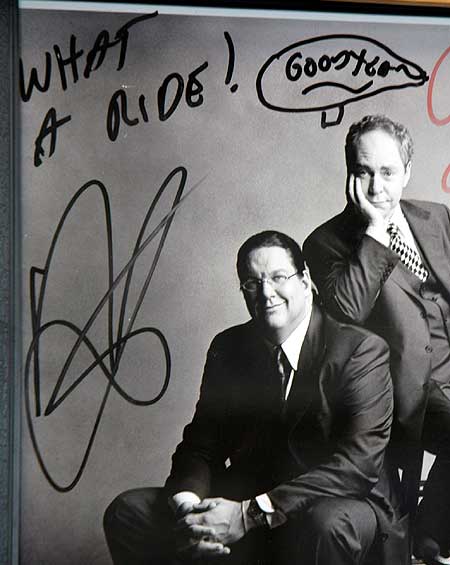Topic: God and US
Deep Thoughts: Mondays With Murrow
When one no longer commutes to work but leads the life of an obscure minor writer and professional photographer (actually sold a few) in Hollywood, one doesn't often listen to what made creeping along in Los Angeles morning traffic tolerable - National Public Radio's "Morning Edition." There's no way to listen to that in this old Hollywood apartment building, built in the late sixties - the floors and load-bearing walls are poured concrete with reinforcing bar. Only KUSC, the classical music station, seems to be able to push its FM signal through all that, and the oldies station - but how much of the Beach Boys and the Supremes can one take? I never "got" Diana Ross. So mornings are the cable news shows murmuring in the background, reading the paper, and checking the news services and blogs on the net - and lots of black coffee and smoking the pipe.
But it seems you can miss a lot by not driving off into the sunrise each weekday to face the next systems problem and the crew of eager computer folk, listening to NPR so you don't have to think about servers and code and all that stuff before you get there.
What I missed? On April 4th of this NPR started a new Monday series, "This I Believe," and say this is a national project "that invites you to write about the core beliefs that guide your daily life." (No one asked here.)
NPR airs these "personal statements" each Monday on "Morning Edition" and again on the afternoon commute-show, "All Things Considered." And I see by their promo that series producers Dan Gediman and Jay Allison "hope to create a picture of the American spirit in all its rich complexity." Good luck with that.
But the cool thing is "This I Believe" (current version) is based on a fifties radio program of the same name, hosted by Edward R. Murrow. Murrow said his program sought "to point to the common meeting grounds of beliefs, which is the essence of brotherhood and the floor of our civilization." And who spoke on that program? Eleanor Roosevelt, Jackie Robinson, Helen Keller and Harry Truman - and corporate executives, and cab drivers, and scientists, and secretaries.
Jay Allison today - "As in the 1950s, this is a time when belief is dividing the nation and the world. We are not listening well, not understanding each other - we are simply disagreeing, or worse. Working in broadcast communication, there's a responsibility to change that, to cross borders, to encourage some empathy. That possibility is what inspires me about this series."
And these radio essays are going to bring us together?
Well, we are divided. Edward R. Murrow had Joseph McCarthy and all that that fellow stood for - McCarthy was the "us versus them" guy of his day. We have Bill O'Reilly and his new enemies list of people who are bad for America (and don't like him either). O'Reilly says he'll publish that soon. Americans will KNOW who the bad guys are. Joseph McCarthy shouted out "I have a list!" - Bill's doing the same.
NPR has its work cut out here. We are divided. O'Reilly and the whole Fox News network have mounted a campaign to end the oppression of Christians in this country and save Christmas from the secular overloads. See this for a discussion, or check out the new book by another Fox News anchor - John Gibson's The War on Christmas: How the Liberal Plot to Ban the Sacred Christian Holiday Is Worse Than You Thought (Sentinel, October 2005). Bill says we need to get back to what the Founder Fathers intended (but ignores that they worked on Christmas Day 1776 and Christmas wasn't a national holiday before 1870).
And then there's that new Harry Potter film -
Yep witchcraft is a serious problem - always has been.… no matter how skillfully the story gets told or how selfless, ethical and heroic Harry may be, it's impossible for me to invest myself in a series that glamorizes witchcraft.
… Even those in the "go with it" camp may find their patience tested with Goblet of Fire, the first film to warrant a PG-13 rating. It's extremely grim at times and even features the death of a Hogwarts student. I was amazed at the number of small children seated around me in the theater. At what point will moms and dads who've been saying "yes" to voracious young Potter fans decide that things have gone too far?
It's not just the war that divides the country, or social policy (those folks died in New Orleans because they chose to be poor). It's the fundamental stuff, the God stuff, the science stuff, and the sense that there are those who want to understand things and those who have faith and think understanding how things work undermines their chance to meet their savior in the sweet beyond.
It's the big stuff, and this NPR show, independently produced by This I Believe, Inc. in Louisville (that's Gediman and Allison) and Atlantic Public Media in Woods Hole, Massachusetts, and supported by the Farmers Insurance Group of Companies, the Corporation for Public Broadcasting and the Righteous Persons Foundation (Santa Monica, of course), may make things worse.
They will make things worse airing this sort of thing - Monday, November 21, 2005, There is No God by Penn Jillette.
You might remember Penn Jillette from his HBO series Bullshit - documentaries on the odd things people believe. It wasn't very nice to Creationists or "life style coaches" and many other folks. But it was funny. He just let them all talk.
Well, his NPR contribution gets right to this point -
And it all flows from that -I believe that there is no God. I'm beyond Atheism. Atheism is not believing in God. Not believing in God is easy - you can't prove a negative, so there's no work to do. You can't prove that there isn't an elephant inside the trunk of my car. You sure? How about now? Maybe he was just hiding before. Check again. Did I mention that my personal heartfelt definition of the word "elephant" includes mystery, order, goodness, love and a spare tire?
So, anyone with a love for truth outside of herself has to start with no belief in God and then look for evidence of God. She needs to search for some objective evidence of a supernatural power. All the people I write e-mails to often are still stuck at this searching stage. The Atheism part is easy.
But, this "This I Believe" thing seems to demand something more personal, some leap of faith that helps one see life's big picture, some rules to live by. So, I'm saying, "This I believe: I believe there is no God."
Who said one cannot be ethical without being deeply religious - it's impossible as religion is the sole source of all concepts of write and wrong? Dennis Praeger? Jillette says that's bullshit. In fact, he says the opposite is true.Having taken that step, it informs every moment of my life. I'm not greedy. I have love, blue skies, rainbows and Hallmark cards, and that has to be enough. It has to be enough, but it's everything in the world and everything in the world is plenty for me. It seems just rude to beg the invisible for more. Just the love of my family that raised me and the family I'm raising now is enough that I don't need heaven. I won the huge genetic lottery and I get joy every day.
Believing there's no God means I can't really be forgiven except by kindness and faulty memories. That's good; it makes me want to be more thoughtful. I have to try to treat people right the first time around.
And then there's this -
Yes, it is hard to agree on reality - just what is what - when you cannot talk, or more precisely, when it is a given that no matter what one party says the other cannot and will not consider anything about it. How did Swift put it? - "It is useless to attempt to reason a man out of a thing he was never reasoned into."Believing there's no God stops me from being solipsistic. I can read ideas from all different people from all different cultures. Without God, we can agree on reality, and I can keep learning where I'm wrong. We can all keep adjusting, so we can really communicate. I don't travel in circles where people say, "I have faith, I believe this in my heart and nothing you can say or do can shake my faith." That's just a long-winded religious way to say, "shut up," or another two words that the FCC likes less. But all obscenity is less insulting than, "How I was brought up and my imaginary friend means more to me than anything you can ever say or do." So, believing there is no God lets me be proven wrong and that's always fun. It means I'm learning something.
And Jillette then turns the "personal responsibility" mantra of the evangelical Christian right on its head. Not believing in God makes you more responsible and forces you to deal with things. As in this -
This man is dangerous. He thinks we mere mortals here on earth can fix things - it's not in God's hands.Believing there is no God means the suffering I've seen in my family, and indeed all the suffering in the world, isn't caused by an omniscient, omnipresent, omnipotent force that isn't bothered to help or is just testing us, but rather something we all may be able to help others with in the future. No God means the possibility of less suffering in the future.
On the other hand, what he says may be a reply to this NPR segment on "What I Believe" - William F. Buckley, Jr. on May 23, 2005, How Is It Possible to Believe in God?
Buckley doesn't exactly answer the question, but he doesn't answer the question quite elegantly -
You can almost hear Penn Jillette mutter the name of Jillette's old HBO series. Search high and low in everything Darwin wrote and you won't find any reference to Hamlet being the result of some process of natural selection. Darwin does not address why people write really good literature (or bad literature either), nor does he discuss cheeses or glass blowing. The "elderly scholar" just missed the point. But it's good enough for Buckley.I've always liked the exchange featuring the excited young Darwinian at the end of the 19th century. He said grandly to the elderly scholar, "How is it possible to believe in God?" The imperishable answer was, "I find it easier to believe in God than to believe that Hamlet was deduced from the molecular structure of a mutton chop."
That rhetorical bullet has everything - wit and profundity.
Then there's this -
Let's unpack that. That "historical cosmologist" (Marx) is dead, so what does he know? Look at all them stars up there! Could be just a natural phenomenon, or could be a big design by God. Assume the latter. Why? Because it feels good to assume the latter? No, just because it's easier.It has more than once reminded me that skepticism about life and nature is most often expressed by those who take it for granted that belief is an indulgence of the superstitious - indeed their opiate, to quote a historical cosmologist most profoundly dead. Granted, that to look up at the stars comes close to compelling disbelief - how can such a chance arrangement be other than an elaboration - near infinite - of natural impulses? Yes, on the other hand, who is to say that the arrangement of the stars is more easily traceable to nature, than to nature's molder?
As in this -
He just doesn't want to "submit" to the other concept - "felicitous congeries" - the idea that you can examine natural phenomena and see how things thing developed - this happened which caused this which cause that and then we got a sky full of stars. Yep, they're pretty, and that is felicitous of course. But empirical science - figuring out what happened from the evidence - here is something he call mere congeries - magic tricks.This I believe: that it is intellectually easier to credit a divine intelligence than to submit dumbly to felicitous congeries about nature.
I guess we shouldn't have had that Enlightenment.
And maybe I should listen to the radio a bit more.
__
Penn Jillette (on the left) on display in the offices down at the Goodyear Blimp - he took a ride and left a photo -

Edward R. Murrow on Hollywood Boulevard

Posted by Alan at 18:33 PST
|
Post Comment |
Permalink
Updated: Monday, 21 November 2005 18:40 PST
home




